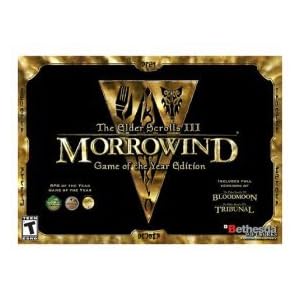
I've been slowly working my way through this game's main quest for just shy of three years now (you can check out my pretty much abandoned attempt at chronicling that here), and only really got in gear to finish it recently when it dawned on me that we're only four months away from the next Elder Scrolls game coming out. I didn't want it hanging over me when I dove back into that world. The funny thing is, despite "beating" the game, I've barely scratched the surface of what's available, especially if you include its two expansions. I finished the main quest, I made some advances in a couple guilds, I did a bit of side questing, but there are entire factions I never interacted with and whole regions I didn't really explore. This series is known for its hugeness, and Morrowind certainly doesn't disappoint in that regard. I'd like to at least finish the main quests for the expansions at some point, but even if I don't, I sank a lot of hours into the game without coming close to running out of stuff to do.
Comparing Morrowind with The Elder Scrolls IV: Oblivion, the sequel that came out four years later, it's easy to see what was improved and what took a step back in the name of user friendliness. Most of the gameplay in Morrowind feels pretty archaic at this point - you still have the ability to wield a variety of weapons and magic powers, but it's more awkward to select what you want to use, and the combat itself is amazingly archaic. There are a few different attack types, but all they seem to do is provide different advantages based on the type of weapon, and fighting someone (or something essentially boils down to repeatedly clicking on and hoping the numbers say you got a hit. There can be a lot of planning and strategy in one of the more difficult encounters - rarely have I put as much thought into what potions or scrolls I'll use before I rush into battle in other games. It still feels kind of crummy though, especially when 2002 really wasn't that long ago (though it was closer when I started playing).
This gameplay simplicity is felt in the quest design as well. There's a richness to Morrowind's world, with many different groups representing very different ideas, all having opinions about each other. Most NPCs have a ton of dialogue, unvoiced and occasionally shared but well written, and you can find out a lot just by asking. As far as the quests I actually did though, all of that flavor didn't have much impact on what I was actually asked to do. You spend your time tracking down monsters, recovering items, and talking to people, and not much of gets more interesting than that. I didn't find much as instantly compelling as the more memorable quests from Oblivion, where you're solving a mystery or being transported to another plane of existence. I won't complain about the fact that the quests hold your hand a lot less than in the sequel, because pretty much everything you need to know is there to find if you're inquisitive enough. There's no markers telling you where to go on the map, the journal is more of a log on what you know than instructions on what to do next, and you can only jump from one part of the map to another by paying someone to transport you. It can lead to frustration if you just want to get things done without puzzling out yourself what comes next. But it's not really a game for people who have no curiosity, the whole point of the game is sort of to uncover things at your own pace.
The presentation of the game is acceptable, though it's hard to say how it fared at the time. Other games definitely run smoother with better quality visuals, but Morrowind gets a lot of credit for its scale. As I mentioned the voice acting is limited to brief snippets when you approach a character, but it works well enough to sell the setting, and the music is nice without being too explosive, plus it's useful when it changes up to let you know when an enemy is near. The sound effects are pretty basic, but they're also functionally useful. Unfortunately the game is pretty messy technically. Even though it came out years ago, it still has stability problems, crashing more often than you'd like for a game that could stand to autosave a bit more often. There's some awkwardness in the game engine too, with lots of NPCs and monsters having difficulty finding their way over to you. Cliff Racers are already incredibly annoying, when you combine that with the game's troubles getting them to fly to you correctly, you have one of the worst game enemies of all time.
In any case, I wanted to get a taste of Morrowind, the predecessor of one of my favorite games ever made, and in the end I definitely got that. I didn't find it to generally be nearly as fun to actually play for hours on end, but there is something unique about the game that I think I appreciated. The main quest is certainly more interesting from a conceptual perspective than Oblivion's, for a start. Just wandering around a city at night, looking up at the vivid sky of Tamriel, searching for the next person who will help you keep moving forward, you realize the great job they did creating a sense of place that most games even now sometimes struggle with. I would love to see the detail of Morrowind enhanced by enjoyable gameplay like Oblivion's. Hopefully The Elder Scrolls V: Skyrim can come close to doing that this November.
AAAAAGGGHHHH
16 years ago


































No comments:
Post a Comment